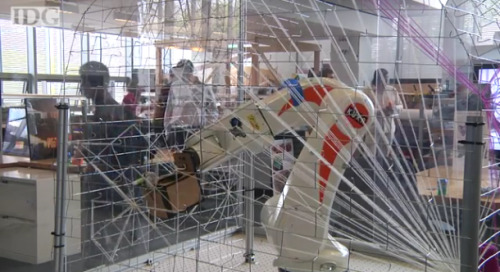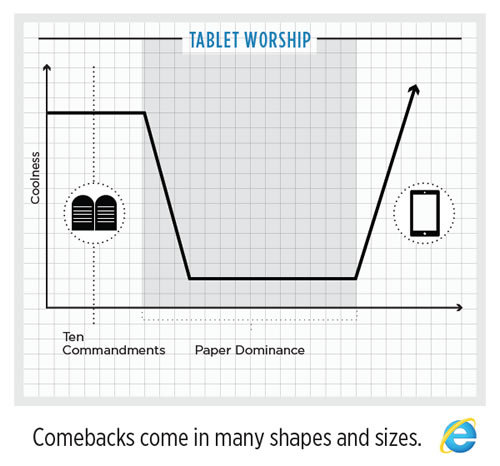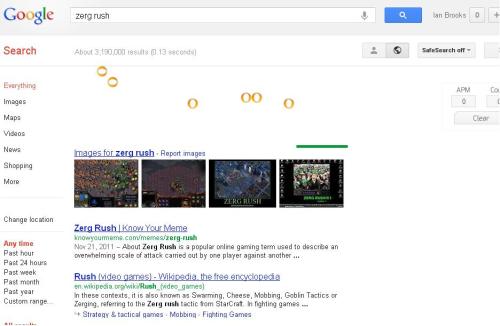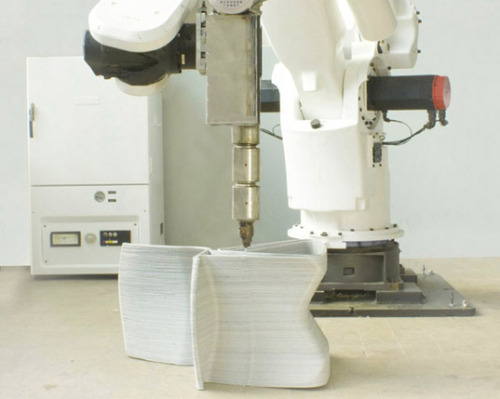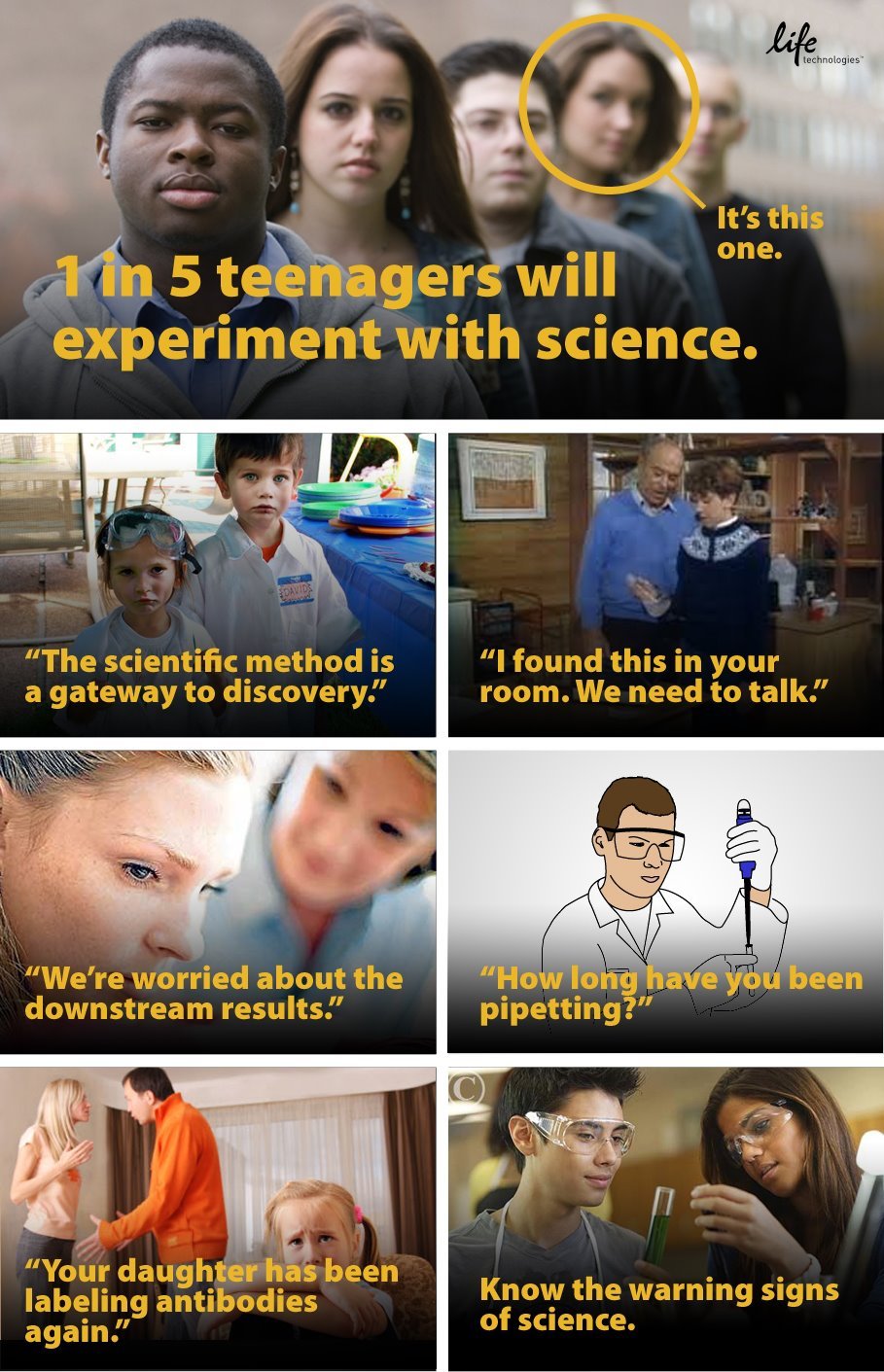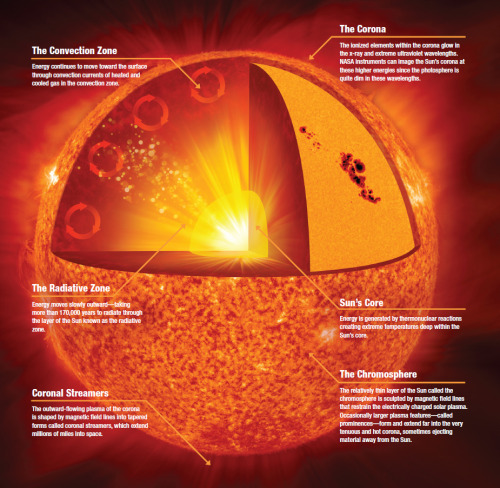Squirrel Monkey imagines what LinkedIn might have looked like if it was created in the 1980s.
Monday, April 30, 2012
Video: If LinkedIn Was Created In the 1980s
News: Olympics to ban social network photos?
Olympics to ban social network photos?:
"The London 2012 conditions state: ‘Images, video and sound recordings of the Games taken by a Ticket Holder cannot be used for any purpose other than for private and domestic purposes and a Ticket Holder may not license, broadcast or publish video and/or sound recordings, including on social networking websites and the internet more generally, and may not exploit images, video and/or sound recordings for commercial purposes under any circumstances, whether on the internet or otherwise, or make them available to third parties for commercial purposes.’Source: Amateur Photographer
Ruck, a semi-retired freelance, blasted the rules as unenforceable.
He said there will be a 'million and one' people taking photos and video, whether by camera or mobile camera phone."
OpEd: The world is losing its ability to reconstruct history
Bit rot: The world is losing its ability to reconstruct history:
Source: The Economist
PICTURE yourself as a historian in 2035, trying to make sense of this year’s American election campaign. Many of the websites and blogs now abuzz with news and comment will have long since perished. Data stored electronically decays. Many floppy disks from the early digital age are already unreadable. If you are lucky, copies of campaign material, and of e-mails and other materials (including declassified official documents), will be available in public libraries.
But will you be able to read them? Already, NASA has lost data from some of its earliest missions to the moon because the machines used to read the tapes were scrapped and cannot be rebuilt. A wise librarian will wish to keep in working order a few antique computers that can read such ancient technologies as CDs and USB thumb-drives. But even that may not be enough. Computer files are not worth anything without software to open them.
One way round that is to print everything out. If you use durable acid-free paper, this will reach at least the level of accessibility of medieval manuscripts, handwritten on vellum. But printouts of digital material are a second-best solution. They risk losing the metadata that make documents interesting: e-mails make most sense as threads, not as stacks of paper. Only in digitised form can data be sifted and crunched.
Source: The Economist
Tech: Teaching Robots How to Spin a Web
MIT's web-spinning robot: Be very afraid?
As Nick Barber of IDG News reports, the Mediated Matter Group at MIT’s Media Lab is working on a robot it hopes will one day be able to scan its surroundings and weave a structure that’s attached to elements in the environment.Via: CNET News
The machine isn’t able to do this just yet, but… it can be preprogrammed to weave a pretty mean web using pegs and hooks that it’s been told the positions of.
The researchers, who also study 3D printing, drop phrases like “additive manufacturing processes” and say that eventually they’ll replace the yarn shown in the video with nylon that will harden once it’s put in place. One can imagine manufacturing or construction methods that involve a machine that works with a given physical framework to create custom designs.
“We’re working on the sensing so it knows where it’s going on its own,” Research Assistant Elizabeth Tsai says in a short article by Barber.
Video Distraction: Building Tetris
On April 20th, hackers at MIT converted the Green Building on campus into a giant playable game of Tetris.
Via: BostInno & Hacker News
Gadgets: Brydge
Brydge is a combination keyboard and case for iPad that when attached, converts the tablet into a laptop. It is made of machined aluminum and attaches to the iPad with a special quick release hinge. Brydge is by Los Angeles-based designer Brad Leong, Sam, & Eddy. They are currently raising funds for the project on Kickstarter.
Humor: IE Infographics
Cool campaign from - wait for it - Internet Explorer. I know, right? Who would have thought it. But its funny, simple and honest.
Sunday, April 29, 2012
OpEd: Does the Internet Breed Killers
Does the internet breed killers?
"Indeed, virtual networks like Facebook, YouTube, Wikipedia and the World of Warcraft seem to offer as good clues as any to why this 32 year-old man should decide one day to blow up and shoot as many fellow Norwegians as he could.Source: CNN
Most troubling of all is Breivik’s obsession with the multiplayer role-playing World of Warcraft, a violent online game that he played “full-time” between 2006 and 2007. Indeed, one of the few times that he smiled this week was when the image of his World of Warcraft character was displayed in court."
Note: I just want to let all of you know that we’re all killers... and CNN's oped pieces have recently become very questionable of late.
Friday, April 27, 2012
Video: The World Is Obsessed With Facebook
An informational motion graphics piece by Alex Trimpe
Thursday, April 26, 2012
Daily Links: April 26, 2012
This interactive art work by Jeremy Deller entitled “Sacrilege”, is a full 1:1 scale of Stonehedge for kids to run around and bounce on, as part of Glasgow’s International Festival of Visual Arts exhibit. Were we not supposed to be jumping on the actual Stonehenge this entire time? Somebody should have told me.
Adulting: How to become a grown-up in 387 easy(ish) steps.
Is this the banana your grandchildren will eat?
Messages with a Bottle is the hilarious comedy of a new father as he comes to grips with fatherhood.
The Official Hipster Survival Guide to New York City
Wednesday, April 25, 2012
Daily Links: April 25, 2012

This is rad. A Super Mario Summary is every level in the original Super Mario Brothers game, each recreated on a single screen. This was Jonah’s entry to the 23rd Ludum Dare 48 hour game development challenge.
H. P. Lovecraft answers your relationship questions.
Lessons in the Art of Pillow Fort Construction "Tether your sheets and blankets securely, but try not to get too attached yourself." How To Build A Great Blanket Fort, Blanket Fort Birthday Party.
Your Logical Fallacy Is... complete with free downloadable infographic poster.
The new plans Disney has for allowing people to schedule everything from ride times to food makes a trip to Disneyland sound more like work than fun, but the obsessive compulsive in me secretly can wait to try it.
Tuesday, April 24, 2012
Link Round-Up: April 24, 2012
Check out this Lickable Wallpaper installed in a London elevator
For centuries, ships navigated by the stars. Thousands of ships' logs representing hundreds of thousands of position readings were diligently recorded by sailors for a future use they never could have imagined: 100 years of ocean travel 1750 to 1850.
Here’s an image blog with a topic I’d never have expected to see: Context-free patent art. Most of it is related to video games, but they’re also kind of humorous to think about being actually used.
In 1942, as part of the Manhattan Project, the U.S. government acquired 70,000 acres of land in Eastern Tennessee and established a secret town called Oak Ridge. The U.S. Department of Energy’s Oak Ridge office recently started to digitize its collection of archival photos and share them. Here's some archival film of the construction of Oak Ridge during the WWII Manhattan Project.
Kveendolnitza is a point-n-click adventure in the same vein as Samoroast, so enjoy weird creatures, strange puzzles, and plenty of unique architecture. And don’t forget to find all those secrets the ancients left behind, too…
Monday, April 23, 2012
Link Round-Up: April 23, 2012
Garnier Opera in Paris, France
Photographed by David Leventi
The 16th Annual Webby Awards Nominees Have Been Announced
A 'Doomsday shelter' is being built below Kansas prairie where millionaires will be able to sit out the Apocalypse in style
Infographic on lakes, oceans, and what lies beneath.
Led by Phish drummer Jon Fishman, approximately 1,600 participants took part in the World’s Largest Cowbell Ensemble on Saturday on Church Street in Burlington, VT, beating the previous record of 640, set in Switzerland in 2009. Song used to set the new record: The Chambers Brothers' "Time Has Come Today."
Map of the Dead is a zombie survival map created using the Google Places API
Pie a la Apple is a recipe for completely edible, single serving apple pies made out of the apples themselves.
'Zombies' remind drivers of handheld-phone ban
Sunday, April 22, 2012
Photo: Lightning-Struck Bridge
Check out this amazing photo of the San Francisco-Oakland Bay Bridge being struck by lightning several times during the epic storm of April 12, 2012. This is a single exposure shot, according to the photographer Phil McGrew.
Source: Daniel Terdiman and Daily Mail
Saturday, April 21, 2012
Friday, April 20, 2012
Photo: Urban Landscape
Thursday, April 19, 2012
Wednesday, April 18, 2012
History: 1982 Cartoons Envision Wireless Future
These drawings date from 1982 (thirty years ago). Alan Kay had just become the Chief Scientist at Atari and he asked me to work with him to continue the work I started at Encyclopedia Britannica on the idea of an Intelligent Encyclopedia. We came up with these scenarios of how the (future) encyclopedia might be used and commissioned Glenn Keane, a well-known Disney animator to render them. The captions also date from 1982.
The most interesting thing for me today about these images is that although we foresaw that people would be accessing information wirelessly (notice the little antenna on the device in the “tide pool” image, we completely missed the most important aspect of the network — that it was going to connect people to other people.
Great Design: 3D Printed Chairs
Here's an interesting project that combines ecology, design, and robotics. Electronic waste gets grounded into a paste which is used as the material to construct a chair by a robotic arm.
Dirk Vander Kooij is set to unveil a new line of “Endless” furniture made from recycled e-waste at “The Future in the Making”, an exhibition organized by Domus that will take place during Milan Design Week 2012. The young winner of the 2011 Dutch Design Award has reprogrammed an old industrial robot to extrude electrical appliances into chairs and tables. Vander Kooij, who until now has focused on synthetics, will present a new and different range of materials in Milan.
Demo: Jet Pack
In this unbelievable new video, Swiss pilot Yves Rossy (previously) is seen soaring above the Swiss Alps with his one-of-a-kind jet-propelled wing craft. It’s incredible to me that after well over a century of manned flight, we continue to make technological advances like this. Rossy was filmed by aerial camera operator Evert Cloetens.
Photo: Derweze
Derweze, also known as the door to hell, is a 70 meter wide hole in the middle of the Karakum desert in Turkmenistan. The hole was formed in 1971 when a team of soviet geologists had their drilling rig collapse when they hit a cavern filled with natural gas. In an attempt to avoid poisonous discharge, they decided to burn it off, thinking that the gas would be depleted in only a few days. Derweze is still burning today
Tuesday, April 17, 2012
Monday, April 16, 2012
Lecture: David Brin Talks at Google
David Brin is a scientist, speaker, technical consultant and world-known author. His novels have been New York Times Bestsellers, winning multiple Hugo, Nebula and other awards. At least a dozen have been translated into more than twenty languages.
As a speaker, he is best-known as a "futurist" who comments plausibly and entertainingly about trends in technology and society, including some of the challenges that may confront our rambunctious civilization in the decades ahead. One favorite topic: creativity, or helping members of the audience think "out of the box" about both near- and long-term problems.
Infographic: Blogging is Like Sex
Gadgets: Transition Flying Car
The Transition is a street-legal airplane that operates as both a car and aircraft (video). It completed its maiden flight in March, and is expected to be on sale to the public sometime in 2013. The Transition is being developed by Massachusetts-based Terrafugia.
Sunday, April 15, 2012
Photo: León at Night
The Spanish city of León seen at night; photographed by an Expedition 30 crew member from the International Space Station.
Saturday, April 14, 2012
Friday, April 13, 2012
Gadgets: Dress Becomes Transparent When Aroused
This Dress Becomes Transparent When Aroused - as part of the women's style series on clothing and fashion by GeoBeats.
If you thought extreme fashion was just for a woman's enjoyment, we have uncovered an exciting fashion piece that will certainly delight men worldwide!
According to Metro UK, the edgy garment, named 'Intimacy 2.0' becomes transparent when the wearer is aroused. Its designer, Daan Roosegaarde constructed it using leather as well as smart e-foils that are opaque but become see-through as the heart rate of the person wearing the dress increases.
In the words of the designer, it is a fashion project exploring the relation between intimacy and technology. Social interactions determine the garments' level of transparency, creating a sensual play of disclosure.
The Washington Post suggests how the dress may play out in a bar setting: "if a gentleman at the bar gets a woman's heart racing, the dress will show more skin. A dull conversation from an unwanted suitor will keep the dress opaque."
Lecture: What is Matter
What is matter, anyway? What does it have to do with math? And why aren’t you made of Jesus? Delving deeper into the theory of (almost) everything – the Standard Model of particle physics.Source: MinutePhysics
Infographic: Gaming is a Positive Element
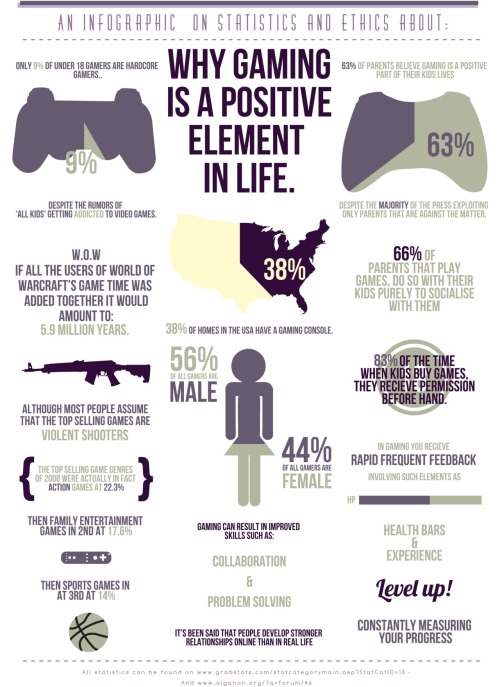
"I had a load of questions playing around my head about statistics of gaming and i found it quite hard to find straight forward concise answers to these questions. So i decided to create an info-graphic which was simple and to the point yet graphically beautiful, so i created this along side 3 others, basically blown up statistics. They were designed to influence peoples judgement on gamers, as the majority of non gamers have a narrow minded view, such as, saying gaming is a waste of time, and makes people lazy, etc"
Video Distraction: Levitating Water Droplets
Making water appear to levitate usually requires a strobe light to trick the eye. If you don't have a fancy system to control water flow, you can run water through a tube taped to a speaker playing very low frequency sound, and again use a strobe light to make the water appear to defy gravity. Or you can ditch the strobe, and sync the sound waves to the frame rate of a video camera to make water drops appear to hover.
Tech: Watch an iPad get Made
Marketplace Shanghai Bureau Chief Rob Schmitz is only the second reporter ever to gain access to visit the factory floor at Apple's Chinese manufacturer, Foxconn. This video highlights his tour of the assembly line and the Foxconn campus, where he learned first-hand what living and working conditions are like for the hundreds of thousands of workers there.
Read his Reporter's Notebook for more insight and analysis from his trip:
The first misconception I had about Foxconn’s Longhua facility in the city of Shenzhen was that I’ve always called it a ‘factory’ -- technically, it is. But after you enter the gates and walk around, you quickly realize that it’s also a city -- 240,000 people work here. Nearly 50,000 of them live on campus in shared dorm rooms.Source: MarketPlace
There’s a main drag lined on both sides with fast-food restaurants, banks, cafes, grocery stores, a wedding photo shop, and an automated library. There are basketball courts, tennis courts, a gym, two enormous swimming pools, and a bright green astroturf soccer stadium smack-dab in the middle of campus. There’s a radio station -- Voice of Foxconn -- and a television news station. Longhua even has its own fire department, located right on main street.
This is not what comes to mind when you think "Chinese factory."
Gadgets: iPad-controlled Super Yacht
Looking at cool concept designs for super yachts may be fun, but nothing beats the real thing. It took five years and $15 million dollars, but the ultimate seafaring vessel that looks like a spacecraft is finally here.
The Adastra superyacht is 140 feet long, weighs 52 tons, and can travel 4,000 nautical miles at 17 knots, enough to get you from the U.S. to Europe. Designed by John Shuttleworth and constructed in China by McConaghy Boats, the Adastra can fit up to nine guests along with its six crew members. All that and you can control the vessel from your iPad. You can see more of the Cylon Raider of the sea in the gallery below.
Source: DailyMail
Photo: New Amsterdam Plein & Pavilion
Thursday, April 12, 2012
Photo: Príncipe Felipe Science Museum
Wednesday, April 11, 2012
Tech: 10 Future Technologies That Exist
From human organ printing to hologram TV, here are 10 technologies that come straight from the future.
Science: Fermi Provides New Insights
No one knows what dark matter is, but it constitutes 80 percent of the matter in our universe. By studying numerous dwarf galaxies — satellite systems that orbit our own Milky Way galaxy — NASA’s Fermi Gamma-ray Space Telescope has produced some of the strongest limits yet on the nature of the hypothetical particles suspected of making up dark matter.
Tech Links: April 11, 2012
City Maps is an app that displays Store Logos
The future of all maps: include a view that is ‘logos’, just like streets or satellite.
Entertainment
Infographic: Google’s Algorithm Changes
Infographic: How To Get More Clicks On Your Tweets
Infographic: Instant America
Infographic: Social Media Demographics
Infographic: World Top 10 Internet IPOs
Gadgets
8 Amazing Technological Advancements in Today’s Prisons
News
Find My iPad, Find Their 780 Pounds of Meth
Just beating Bank of America, Consumerist readers have voted Electronic Arts the worst company in America
"NASA is one of the few institutions I know that can inspire five-year-olds. It sure inspired me, and with this endeavor, maybe we can inspire a few more youth to invent and explore." An undersea expendition funded by Amazon founder Jeff Bezos has discovered the spent rocket engines used to power Apollo 11.
A picture is worth a thousand words and a billion dollars. Facebook has bought Instagram for $1 billion in a combination of cash and shares of Facebook. This is striking for since Instagram was valued at $500 million last week, though, right before the purchase they raised $50 million in venture capitol showing they have the ability to raise lots of money quickly. Instagram is notable for having 30 million users despite having been iOS-only until recently creating an Android app. Facebook had been rumored to be working on a photo sharing app, however, like Microsoft buying Skype, the user base was may have been real value, not the easily replicable technology. For those that rue this news, there are alternatives to host your sepia toned cell phone pictures.
Video-Game Companies Agree to Close Sex Offenders’ Online Accounts
Reading & Discussion
Al Franken: How Privacy Has Become an Antitrust Issue
It’s probably not unrealistic to say that porn makes up 30% of the total data transferred across the internet.
Twitter is being used as a crime-fighting tool by a tech-savvy village chief in Kenya. Francis Kariuki, the administrative chief of Lanet Umoja, has used the micro-blogging site for everything from tracking down missing sheep to stopping home invasions.
Web developer Justin Watt was staying at the Courtyard Marriott in Times Square, New York and using the hotel wifi to access the Internet. He noticed some strangeness on his website... and on every other website he visited (not to mention YouTube was broken.) : "In short, Marriott is injecting JavaScript into the HTML of every webpage its hotel customers view for the purpose of injecting ads (and in the meantime, breaking YouTube). Marriott’s wireless internet service provider is a third-party company called Hotel Internet Services, so it is possible, though unlikely, that Marriott doesn’t know what’s going on. But it’s crazy to me that I’m paying $368 a night for a hotel room, and this is how I get treated."
Resources & Software
Google Maps vs OpenStreetMap vs others: the article and the tool
Science
High resolution wiring diagram of a brain reveals astonishing simplicity.
Technology
These Are The Prices AT&T, Verizon and Sprint Charge For Cellphone Wiretaps. After a flurry of public records requests to over 200 police departments, the ACLU has obtained a trove of documents detailing police tracking of cell phone location, call logs and more, including a price list for subscriber information from every major US carrier.
Tutorials
How do I find Waldo with Mathematica?
Tuesday, April 10, 2012
Architecture: Shimao Shanghai Wonderland
The Intercontinental Shimao Shanghai Wonderland by Shanghai Shimao Property Group
Ground broken on a groundscraper-hotel in an abandoned quarry Shanghai that will feature a “waterfall” constructed of glass and two underwater levels.
Video Distraction: Tiny Organisms Seen Through a Microscope
Science: Mysteries of the Sun
NASA has just released five new videos called “Mysteries of the Sun”. The videos describe the science of the sun and its effects on the solar system and Earth. Scientists study the sun not only to better understand the orb that influences life, but also to study how it sends solar material out into space, filling up the bubble that defines the farthest reaches of the solar system.
The sun can also impact Earth’s technology: solar storms can affect our communications satellites and cause surges in power lines. These movies cover the breadth of solar, heliospheric, and geospace science, a field known as heliophysics.
The five movies, available online at http://missionscience.nasa.gov/sun and on DVD, cover five areas of heliophysics: Space Weather, Solar Variability, the Heliosphere, Earth’s magnetosphere, and Earth’s upper atmosphere.
In addition to the movies, there is a guidebook (PDF, 38.8MB) with full-color images, diagrams, and charts that will make the science of heliophysics clear for all readers. The topics covered include the anatomy of the Sun, the solar cycle, solar storms, and solar variability, as well as the Sun’s effects on space weather and the Earth’s magnetosphere and upper atmosphere such as the Aurora.
Reading: Einstein’s Advice to a Little Girl
Dear Professor Einstein: Albert Einstein's Letters to and from Children:
The following exchange took place across several letters written between Einstein and a bright, witty South African girl named Tyfanny, who reminded Einstein of his own granddaughter, at about the time Einstein was at the height of his career and cultural prominence.
In a letter dated September 19, 1946, Tyfanny writes:
The following exchange took place across several letters written between Einstein and a bright, witty South African girl named Tyfanny, who reminded Einstein of his own granddaughter, at about the time Einstein was at the height of his career and cultural prominence.
In a letter dated September 19, 1946, Tyfanny writes:
I forgot to tell you, in my last letter, that I was a girl. I mean I am a girl. I have always regretted this a great deal, but by now I have become more or less resigned to the fact. Anyway, I hate dresses and dances and all the kind of rot girls usually like. I much prefer horses and riding. Long ago, before I wanted to become a scientist, I wanted to b e a jockey and ride horses in races. But that was ages ago, now. I hope you will not think any the less of me for being a girl!Sometime between September and October 1946 — a snappy response time by the day’s standards — Einstein replies:
I do not mind that you are a girl, but the main thing is that you yourself do not mind. There is no reason for it.
Tech: The Hunt for AI
Marcus Du Sautoy wants to find out how close we are to creating machines that can think like us: robots or computers that have artificial intelligence. His journey takes him to a strange and bizarre world where AI is now taking shape. Marcus meets two robots who are developing their own private language, and attempts to communicate to them. He discovers how a super computer beat humans at one of the toughest quiz shows on the planet, Jeopardy. And finds out if machines can have creativity and intuition like us. Marcus is worried that if machines can think like us, then he will be out of business. But his conclusion is that AI machines may surprise us with their own distinct way of thinking.
Source: BBC
Daily Links: April 10, 2012
The Right Beer For the Occasion
Photo by Gamelaner
The 41 most common cooking/baking mistakes
50 Killer Ikea Hacks to Transform Your Home Office
The AV Club's Todd Van der Werf enters the Dungeon "I’ve been at this for three days straight, and I need to start getting back to my everyday life, to start settling back into my real role as a TV critic with -3 dexterity. I go through the motions of playing the good guy, of standing in front of doors as we open them, in case they’re booby-trapped. This, of course, is how I end up getting splashed with copious amounts of acid, which begins to eat away at my health. (“It’s not a second-edition game unless there’s a room full of acid,” Brett says, and everyone agrees.) Instantly, I’m into it."
Do you love Weatherscan? Sure, we all do. But what do you do when you want to listen to the soothing and comforting Weatherscan soundtrack but can't get to a television? A kindly internet user has provided a playlist for just such an occasion. If your usual go-to weather is Local on the 8s, The Weather Channel also thoughtfully provides their month-by-month playlist.
Food Network Magazine's 100 Greatest Cooking Tips (of All Time) goes beyond the basic "taste-as-you-go" kind of advice (though it's in there).
Internet April Fool's Prank Watch, 2012
An illustrated guide to common logical fallacies as well as well as a very nice worked example of the fallacies involved in Cardinal Keith O'Brien's recent(ish) article against gay marriage.
OMG SPACE aims to illustrate the scale and the grandeur of our solar system, as well as illustrate through the use of infographics our work in the exploration of our solar system with various spacecraft.
Tech: Eccerobot
ECCEROBOT is a research robot with a human anatomy-inspired structure of mechanical bones, joints, muscles, and tendons. The European research team developing ECCEROBOT believes the robot will have more human-like behavior than standard humanoid robots, simply because it is built more like a human. They are also investigating whether having a human-like structure will help the robot develop a more human-like artificial intelligence.
Source: POPSCI
Thursday, April 5, 2012
Tech: Augmented Reality Glasses
Today Google unveiled preliminary designs and a short concept piece showcasing Project Glass, its augmented reality initiative to create smart shades.
Infographic: How Linux is Built
While Linux is running our phones, friend requests, tweets, financial trades, ATMs and more, most of us don't know how it's actually built. This short video takes you inside the process by which the largest collaborative development project in the history of computing is organized. Based on the annual report "Who Writes Linux," this is a powerful and inspiring story of how Linux has become a community-driven phenomenon.
Wednesday, April 4, 2012
Video: Arthur C. Clarke Predicts the Internet
In 1974, Arthur C. Clarke told ABC that, by 2001, every household will have a computer and be connected all over the world.
Hacks: Floppy Disk Autoloader
Floppy disk enthusiast Dweller has been grappling for some time with how to archive his personal collection of 5000 3.5″ floppies. So he built a Floppy Autoloader that automatically copies and photographs a floppy disk in about three minutes. Via: Hack A Day
I had thousands of old floppy disks to read, and it would have taken forever to process them all by hand.
This is the result, a Copypro CP-2000 wired to an arduino, a motor controller, and a kryoflux. Will automatically work its way through a hundred or so disks at a time.
Photo: Night View of Busan
Tuesday, April 3, 2012
News: deGrasse Tyson is behind change in Titanic re-release

Neil deGrasse Tyson is behind the only major technical change in the Titanic re-release:
It took James Cameron 60 weeks to prepare Titanic for its rerelease, but apart from remastering the original at 4k resolution and converting it to stereoscopic 3D, nothing about the movie has really changed.Source: io9
Well, almost nothing.
According to Cameron: “Neil deGrasse Tyson sent me quite a snarky email saying that, at that time of year [April 15, at 4:20 am], in that position in the Atlantic in 1912, when Rose is lying on the piece of driftwood and staring up at the stars, that is not the star field she would have seen.”
“And with my reputation as a perfectionist, I should have known that and I should have put the right star field in. So I said ‘All right, send me the right stars for that exact time and I’ll put it in the movie.’”
So Tyson did just that, and Cameron re-shot the scene. According to the Telegraph , it is the only major technical change in the film’s re-release.
Lecture: Adam Savage at The Reason Rally
Adam Savage, co-host of Mythbusters, speaks at the Reason Rally on March 24th, 2012.
Monday, April 2, 2012
Photo: Star-Forming Region
Sharpless 2-106, Sh2-106 or S106 for short, a bipolar star-forming region, lies nearly 2,000 light-years from us. The nebula measures several light-years in length. It appears in a relatively isolated region of the Milky Way galaxy.
A massive, young star, IRS 4 (Infrared Source 4), is responsible for
the furious activity we see in the nebula. Twin lobes of super-hot
gas, glowing blue in this image, stretch outward from the central
star. This hot gas creates the two lobes. A ring of dust and gas
orbiting the star acts like a belt, cinching the expanding nebula into
an "hourglass" shape. Hubble's sharp resolution reveals
ripples and ridges in the gas as it interacts with the cooler
interstellar medium.
Sunday, April 1, 2012
Subscribe to:
Comments (Atom)
